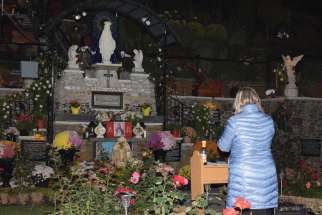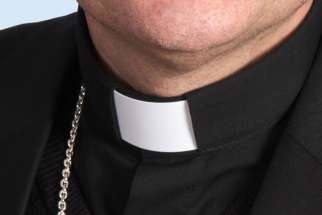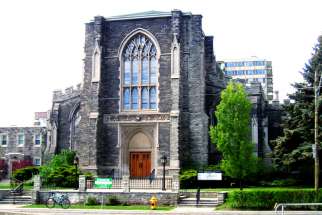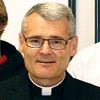Basilians celebrate humble bicentennial
It’s funny how 200 years can sneak up on you, but the Basilian Fathers plan to celebrate their bicentennial quietly, modestly, prayerfully, humbly.
Marian shrine draws faithful following
Every Saturday a group of people gather at the Marian Shrine of Gratitude in northwest Toronto to pray the rosary.
Last week’s record financial award to a man abused by a monstrous priest 50 years ago is cringeworthy on many levels.
Basilians bid adieu to Holy Rosary parish
TORONTO - After 123 years the Basilian Fathers are moving on from Toronto’s Holy Rosary parish. But “as one door closes, another one opens,” said Basilian general superior Fr. George Smith.
TORONTO - The Basilian Fathers are working on a professional development curriculum for teachers that will focus on the distinctiveness of Catholic education.
“We are moving from being the teacher of the students to the teacher of the teachers,” said Fr. George Smith, C.S.B., who pitched the new curriculum at a Basilian conference held last March. “It’s easier for us to be the teachers of the teachers because there are fewer of them (than students).”
Using contemporary adult eduction techniques, which Smith described as “animation and facilitation,” the course aims to re-evangelize teachers, including those in administrative positions.
“We want to bring teachers together to explain what they do. Hear what is distinct about the school that we teach in,” said Smith. “It’s about empowering teachers to stand up and say ‘I’m a teacher in a Catholic school and here is why.’ ”
Expected to be ready for the fall of 2013, the curriculum will first appear in North America’s three Basilian-owned high schools: Toronto’s St. Michael’s College School, St. Thomas High School in Texas and Catholic Central High School in Detroit.
The curriculum will be explained to staff by two Basilian Fathers who will facilitate the program. They will be among 10 to be selected for the role during a Basilian conference in Houston in December.
During the professional development days, the Basilian facilitators will offer their opinion of what a Catholic education should be. The aim is to have teachers re-energized about their faith, which Smith said has become “lukewarm” for most.
In the paper he presented in January, Smith blamed advances in social communications, scientific and technical research, problems of globalization, new and emerging political, economic and religious forces and secularization for weakening the faith among teachers. By reigniting the teachers’ faith, Smith hopes to see a trickle-down effect throughout schools.
“I really see this as a wonderful example of the New Evangelization,” said Smith. “We’re trying to create an environment where children feel as if they’re in a community of faith.”
Although only Basilian schools will be offered this service at first, the intention is to make it available to publicly funded Catholic schools in the long run.
“When I look five years down the road I would like to see this (curriculum introduced) into areas with socio-economic challenges,” said Smith, calling this a preservation of the Basilian roots of educating the impoverished.
But this is about more than preserving Basilian ideologies, said Smith, referring to the “educational emergency” of a Catholic school system that is growing weaker in the faith, a topic Pope Benedict XVI has often discussed.
“We are convinced that if our teachers don’t know why Catholic education is distinctive, then Catholic education will disappear in this country within a generation,” said Smith, adding that it’s the Catholic system’s attention to values which sets it apart.






